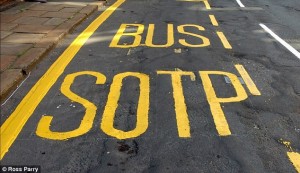Sometimes spelling a word wrong makes a point which would be lost if the word was spelled correctly.
Like Movember.
Or jokes about ‘elf and safety’ in relation to Father Christmas, or gnomes, or The Hobbit.
My computer has hiccups and throws red wriggly lines around when I type Movember, but Movember is about MOustaches in NoVEMBER, which everyone knows, and the Elf joke doesn’t work without mis-spelling Health.
Trendy spellings
Using a z or an x to make a business name seem modern and trendy (or just different from the numerous correctly spelled versions) is also commonplace now. The choir I sing in is called Local Vocalz, and the cat shelter from which we rehomed our cat is Lonely Pawz, to name two I know well. (Lonely Pawz are always keen to find good homes for their rescued cats, by the way, and people with good voices are most welcome to contact Local Vocalz!) But you can find them in search engines if you spell them with the z’s, which is the point.
Sometimes when I write to people to explain my services, I joke about spotting speeling mistaikes, and leave them to laugh, hopefully.
You’ll also want to include mis-spelled versions of your product name as potential search terms on your website, in case your customers aren’t 100% sure how you spell your hotel’s name, or switch two letters around when typing.
So sometimes a spelling mistake is deliberate, and it’s usually obvious why the ‘mistake’ has been made.
When you don’t need a spelling mistake is if you’re writing anything important for your business.
 Anything your customers will read needs to be spelled correctly – website, leaflet, social media posts, email marketing, adverts. I know of a case where a large sum of money was spent on a fancy advertising hoarding, which has spelling mistakes in, but cost too much to replace. And I have seen social media posts advertising an event where the main corporate sponsor’s name was spelled two different ways within two sentences. Ouch!
Anything your customers will read needs to be spelled correctly – website, leaflet, social media posts, email marketing, adverts. I know of a case where a large sum of money was spent on a fancy advertising hoarding, which has spelling mistakes in, but cost too much to replace. And I have seen social media posts advertising an event where the main corporate sponsor’s name was spelled two different ways within two sentences. Ouch!
If your corporate shop window (wherever that appears) isn’t in good English, then your customers could well imagine that you don’t care about getting such details correct – and therefore wonder how careful you are about other details of your business.
A wedding stationers who used the wrong spelling of stationery (stationAry refers to things which aren’t moving) would most certainly not get any business from me – if they can’t spell their product correctly, and don’t check details like spellings, then I make the assumption that they will muck up any printing job I give them.
So do you want to be that company which has people walking away because you can’t spell something on your home page or advertising?
What can you do about it?
The first thing to do is be aware. If you know you have trouble with spellings, or are dyslexic, admit it. It’s only a problem if you don’t do anything about it!
Secondly, use a spellchecker. If you’re working straight into a design programme or web editor that doesn’t have one, write the text in Word (or similar) first, and copy it across. Word’s spellchecker will weed out things like ‘enviromental’ without the n, and may even catch you’re/your issues. It won’t pick up on things like casual / causal though. I saw a homework worksheet recently about connectives, which referred to casual connectives intermittently where it was supposed to be causal connectives. (Words like because, therefore and so, which connect two halves of a sentence and show cause and effect.)
 When you’re using social media (or your phone to email), be especially careful about autocorrect. It’s a complete nuisance sometimes, and there are dozens of hilarious screenshots hanging around on the internet to illustrate what can go wrong if you aren’t careful.
When you’re using social media (or your phone to email), be especially careful about autocorrect. It’s a complete nuisance sometimes, and there are dozens of hilarious screenshots hanging around on the internet to illustrate what can go wrong if you aren’t careful.
Thirdly, phone a friend. Get someone else to check, before you print/publish/post. Even if you’re confident your spelling is top notch, still get someone to check it, if getting it wrong would be embarrassing, expensive to fix, or damaging to your corporate reputation.
If you don’t know someone who can do this for you, call in a professional. Like me, obviously! I can proofread for English mistakes, weeding out your typos and bad spellings. I’ll also ensure that your work is properly punctuated. “Let’s eat Grandma” being quite different from “Let’s eat, Grandma” for instance!
Editing your work so that it flows smoothly, and speaks to the intended audience in language they can relate to, is another post for another time, but I can do that too.
I hope this has been useful, and I look forward to hearing from you if you have trouble getting the letters to behave when you write, and would rather find someone else to sort them out for you.
